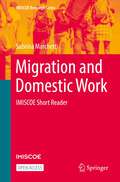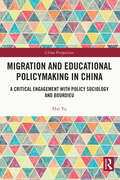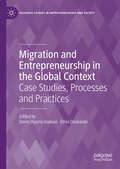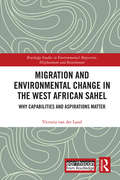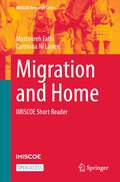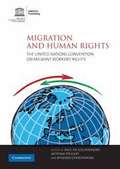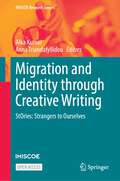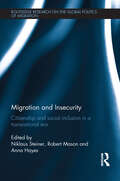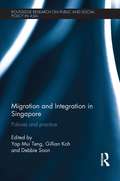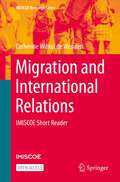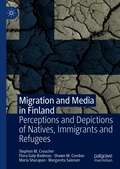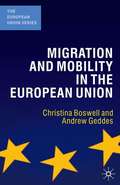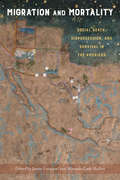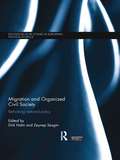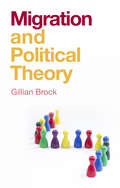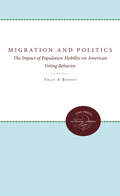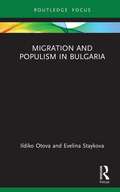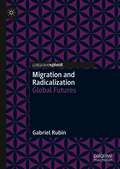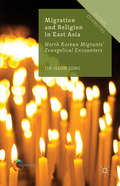- Table View
- List View
Migration and Domestic Space: Ethnographies of Home in the Making (IMISCOE Research Series)
by Paolo Boccagni Sara BonfantiThis open access book provides insight into the domestic space of people with an immigrant or refugee background. It selects and compares a whole spectrum of dwelling conditions with ethnographic material covering a variety of national backgrounds – Latin America, North and West Africa, Eastern Europe, South Asia – and an equally broad range of housing, household and legal arrangements. It provides a fine-grained understanding of migrants’ lived experience of their domestic space and shows the critical significance of the lived space of a house as a microcosm of societal constellations of identities, values and inequalities. The book enhances the connection between migration studies and research into housing, social reproduction, domesticity and material culture and provides an interesting read to scholars in migration studies, policy makers and practitioners with a remit in local housing and integration policies.“This wonderful edited collection extends our understanding of migration not only into the confines of the domestic space but also into the territory of the ethnographer. What does it mean to be a guest in a migrant home? This collection of chapters traverses this question in diverse settings and circumstances of homemaking […]. Boccagni and Bonfanti have skilfully created an intricate lace of ethnographic accounts that provides a nuanced understanding of the built environments where migrants live, how they relate to their homes and how this is articulated in their attitudes toward majority society. The chapters, each on its own and together as a collection, advance our understanding of the researcher being a guest in the migrant home, just like the migrant being a guest in the host country. This complexity of ethnography and positionality makes this edited book an essential reading for migration scholars and ethnographers alike!” Iris Levin, Lecturer in Urban Studies, RMIT University, Melbourne, Australia “This book demonstrates how ethnographies of home and dwelling can bear on the study of migration and its manifestation in domestic space. Entering someone’s home as a researcher challenges our ethical registers: the researcher moves between being a stranger and a guest. The authors point to the dilemmas researchers encounter in intimate settings and how they might be resolved. A valuable and timely book for researchers on dwelling, home and movement.” Cathrine Brun, Professor of Human Geography, Centre for Lebanese Studies, Oxford, UK "This excellent collection delves into the relationship between migration, domesticity, and material culture. It is ethnographically rich and impressively varied in its geographical scope, with insights that will prove extremely useful to scholars and practitioners alike. The great strength of the volume lies in the fascinating diversity, granular detail and methodological care of the contributions, with authors deploying concepts and arguments that prepare a great deal of fertile ground for future work." Tom Scott-Smith, Associate Professor of Refugee Studies and Forced Migration, University of Oxford “This insightful collection departs from the simple yet significant question of roles: What happens when the researcher/participant relationship, becomes guest/host instead? By seeing and interpreting domestic spaces as ethnographic field sites, the contributions shed light on refugees’ and other migrants’ lived experiences of home and housing. Drawing on empirical evidence from diverse types of homes, across geographic locations, Migration and domestic space: Ethnographies of home in the making offers valuable and fresh perspective, encouraging new connections between material and emotional, public and private, in migration research.” Marta Bivand Erdal, Research Professor in Migration studies, Peace Research Institute Oslo (PRIO).</
Migration and Domestic Work: IMISCOE Short Reader (IMISCOE Research Series)
by Sabrina MarchettiThis open access short reader offers a systematic overview of the scholarly debate on the experiences of migrant domestic workers at a global level, in the past as well as in present time. It tackles the nexus between migration and domestic work with a multi-layered approach. The book looks into the issue of (paid) domestic work in migratory contexts by investigating the feminization of migration, thereby considering the larger framework within which this specific phenomenon takes place. The author explains notions such as the “international division of reproductive labor” or “global care chains” which emphasize the inequality in the way care and domestic tasks are distributed today between middle-class women in receiving nations and migrant domestic workers. Moreover, the book shows how women migrating to work in the domestic work and private care sector are facing a complex landscape of migration and labor regulations that are extremely difficult to navigate. At the same time, this issue also addresses employers’ households who cannot find appropriate or affordable care among declining welfare states and national workers reluctant to take the job, whilst legal regulations make difficult to hire a domestic worker who is a third country national. As such this book offers an interesting read to academics, policy makers and all those working in the field.
Migration and Educational Policymaking in China: A Critical Engagement with Policy Sociology and Bourdieu (China Perspectives)
by Hui YuBy concentrating on the topic of school enrolment policy for rural-to-urban migrant children in China, this book analyses the unequal power relations and structural inequalities that can appear in the context of education. The author complements current knowledge by applying theoretical resources of policy sociology, in particular the thinking of Pierre Bourdieu, into analysis of educational policymaking in the Chinese context. He takes a policy trajectory approach to trace the (unequal) power relations and structural inequalities invested and realised in the school enrolment policy. Rooted in rich qualitative data from five metropolises, he examines both external influences of politics, economy and public policy on educational policy agenda setting and discursive practices within the educational policy cycle, inherent in the post-2013 restrictive school enrolment policy. Structural constraints and agency in the local context are also explored, indicating that the intersectional effects of political, economic, and civic logic can result in differentiated modes of policy enactment. The study will be of interest to scholars, students, policymakers and practitioners in helping address policymaking and social justice in education for migrants and other marginalised groups.
Migration and Entrepreneurship in the Global Context: Case Studies, Processes and Practices (Palgrave Studies in Entrepreneurship and Society)
by Denis Hyams-Ssekasi Eirini DaskalakiPresenting a collection of case studies on immigrant and migrant entrepreneurship, this book offers an understanding of the phenomenon as a creation of a distinctive labor market that leads to innovation, productivity, and economic growth. As such, it contributes to SDG 8: 'Promote sustained, inclusive and sustainable economic growth, full and productive employment and decent work for all.'Reflecting on the increasing interest in the subject, contributors provide new perspectives of migrants in diaspora, thus offering a better grasp of lived experiences. Chapters explore the common adversities that immigrant entrepreneurs face, such as the lack of knowledge in terms of operations of the host country market, dealing with unfair treatment, and the subsequent challenge of building long term relationships with locals. Focusing on individual migrant entrepreneurship cases and the recurrent challenges that such entrepreneurs encounter, many of the chapters are written by academics who are migrants with entrepreneurial experiences, which brings a unique insight into the topic. Exploring issues such as gender and enterprise, family business, and entrepreneurial activities, this distinctive collection provides a comprehensive overview of varied experiences of migrant entrepreneurs in both developed and developing countries.
Migration and Environmental Change in the West African Sahel: Why Capabilities and Aspirations Matter (Routledge Studies in Environmental Migration, Displacement and Resettlement)
by Victoria van der LandThe West African Sahel is predicted to be heavily affected by climate change in the future. Slow-onset environmental changes, such as increasing rainfall variability and rising temperature, are presumed to worsen the livelihood conditions and to increase the out-migration from the affected regions. Based on qualitative and quantitative data from study areas in Mali and Senegal, this book examines the relationship between population dynamics, livelihoods and environment in the Sahel region, focussing specifically on motives for migration. Critiquing the assumption that environmental stress is the dominating migration driver, the author demonstrates the important role of individual aspirations and social processes, such as educational opportunities and the pull of urban lifestyles. In doing so, the book provides a more nuanced picture of the environment-migration nexus, arguing that slow-onset environmental changes may actually be less important as drivers of migration in the Sahel than they are often depicted in the media and climate change literature. This is a valuable resource for academics and students of environmental sociology, migration and development studies.
Migration and Home: IMISCOE Short Reader (IMISCOE Research Series)
by Mastoureh Fathi Caitríona Ní LaoireThis open access short reader offers an intersectional perspective on the meaning of home in migration. The book provides a pathway through existing scholarship on home and migration, exploring how intersectional power relations and transnational migration regimes are felt, experienced, lived and navigated by migrants, who are differently positioned, in the making and imagining of home. The meanings associated with home are composed of the interrelation of places, spaces, people, social relations, materialities, emotions and temporalities. These multiple aspects highlight the complexities inherent in the idea of home, which come to the fore particularly when one moves location. Migration and Home explores these issues by focusing on specific key aspects of home in migration: home and gender; home and age; home and materiality; and home and migration status, class and race. It proposes the concept of structural im/possibilities as a framework for understanding the power relations and structures that shape where, when and for whom home in migration is more, or less, possible.
Migration and Human Rights
by Ryszard Cholewinski Paul De Guchteneire Antoine PécoudTwenty contributions from international academics and practitioners discuss the human rights implications of irregular migration in the EU from theoretical, European, and international perspectives. They analyze public perceptions of irregular migrants, assess the impact of immigration policies, and consider various ways of fostering integration. The papers were originally presented at a 2003 conference held at the U. of Leicester.
Migration and Identity through Creative Writing: StOries: Strangers to Ourselves (IMISCOE Research Series)
by Anna Triandafyllidou Alka KumarThis open access book brings together storytelling and self-narrative, creative writing and narrative enquiry to explore a variety of topics in migration from an experiential lens. The volume is hybrid and multi-genre as it contains both scholarly chapters grounded in academic perspectives, as well as personal essays and creative non-fiction. In addition to critical reflections on key migration topics and concepts – like, identity and diversity, integration and agency, transnationalism and return – the scholarly chapters also propose a particular methodology for ‘workshopping’ migration narratives, and writing about (personal) lived experiences through iterations of scientific reflection, narrative enquiry, and creative imagination. The book explores the potential of a new conceptual paradigm and methodological process to learn more, and also `differently,’ about the migration experience. Finally, this volume asks a bigger question too – how do we define the boundaries of research; is it possible to entirely separate the spatial, temporal and methodological parameters in which projects are developed and pursued; and how can the specifics of these multiple contexts contribute to shaping the knowledge being produced?
Migration and Insecurity: Citizenship and Social Inclusion in a Transnational Era
by Robert Mason Niklaus Steiner Anna HayesThis book presents an inter-disciplinary investigation into contemporary migration and social inclusion through an examination of migrant and refugee experience. In this edited volume, contributors discuss new understandings of individual and community security in a world where legal borders and definitions of citizenship no longer adequately capture the reality of migration. Distinguished contributors approach questions of social belonging and inclusion from diverse perspectives. Drawing its primary examples from Australia, Migration and Insecurity is framed by the wider experience of the Global North, with examples from Europe, the United Kingdom and United States woven throughout the collection. An inter-disciplinary approach to migration studies, this book integrates local, national and transnational spaces in its discussion of new constructs of inclusion and security. It considers questions of historical memory, ontological security, transnational communities, the role of civic institutions and social relationships in local spaces to guide the reader towards the wider conceptual questions of migration studies using expertise from the fields of sociology, gender, historical and political studies Migration and Insecurity will be of interest to students and scholars of transnationalism, migration politics and international relations.
Migration and Integration Challenges of Muslim Immigrants in Europe: Debating Policies and Cultural Approaches (Politics of Citizenship and Migration)
by Elena Maestri Annemarie ProfanterAs the impetus of globalization continues to gather pace, more and more people leave their homes pursuing dreams of a better life for themselves and their families. Muslim immigrants converging on Europe from widely divergent communities scattered throughout North Africa, the Middle East and South-East Asia, represent a great variety of local cultures and traditions. Trans-Mediterranean networks form the basis of migration routes and are key factors in the destinations of these migrants and in the overall process of immigration, be this towards Europe or other Muslim countries. South-North fluxes intertwine with South-South fluxes, among which the Gulf Arab countries stand out as a prime destination, not only for low-skilled labour. Different situations emerge, within a variegated discourse on co-existence, integration, assimilation and the preservation of identity. The adoption of this transnational dimension incorporating both destination, and points of origin, enables the investigation of migration to move beyond a purely Eurocentric approach. Thus, different national patterns are analyzed with a focus on a number of significant case-studies. By debating policies and cultural approaches the aim is to add innovative scholarship to the challenge of integration. Cross-cultural pluralism on the part of the nation states comprising the European Union is one avenue for moving the dialogue between different cultural frameworks towards a more compatible form.
Migration and Integration in Singapore: Policies and Practice (Routledge Research On Public and Social Policy in Asia)
by Yap Mui Teng Gillian Koh Debbie SoonBetween 2000 and 2010, Singapore witnessed a huge influx of foreign migrants. The proportion of permanent residents in the total population increased from 7% to 11%, while the share of non-resident foreigners has risen from 19% to 25%. This was as much the result of the spontaneous movement of labour to economic opportunities, as it was of active policy direction by the Singapore government. The social impact, both beneficial and disruptive, of this movement was felt at all levels of society, and brought other attending public policy issues to the fore. Taking a multi-disciplinary approach with a focus on policy and practice, this book examines the social, economic, and political issues that have arisen with the influx of foreigners in Singapore since the turn of the 21st century. Drawing on empirical research, it documents the impact of increasing levels of immigration, and provides an analysis of the longer-term implications of these trends, with each chapter covering a different aspect of socio-cultural, political, or economic outcome arising from intercultural contact and adaptation. The contributors also provide policy suggestions to ensure Singapore continues to be a harmonious nation and a cosmopolitan and vibrant global city. Migration and Integration in Singapore: Policies and Practice will appeal to students and scholars of Southeast Asian studies, migration and social policy, as well as to practitioners and policy-makers with an interest in migration in the region.
Migration and Integration in a Post-Pandemic World: Socioeconomic Opportunities and Challenges
by Lin Lerpold Örjan Sjöberg Karl WennbergAs the world emerges from the COVID-19 pandemic, this book explores current migration and integration challenges. Against the background of long-term migration trends, it asks whether the pandemic has changed the patterns observed, transformed the circumstances international migrants face at destination or whether the opportunities and challenges for integration have been altered. Twenty-four researchers have contributed to this volume with research attention on how COVID-19 has affected transnationalism and identity, labour market employment, and impacted the discrimination of migrants in a variety of ways. Loyalties and tensions created by the need to include also hesitant migrant groups in vaccination programmes are explored. The role of cosmopolitanism and welfare chauvinism in narratives on inward migrations flows, the stance of trade unions on migration, the complexities of implementing return policies, and the challenges faced by unaccompanied refugee youth from Afghanistan are also discussed.
Migration and Integration: The Case for Liberalism with Borders
by Tom FarerMigration and Integration clarifies and proposes answers for all of the politically toxic questions associated with large-scale migration from the Global South to the Western liberal democracies. Driven by the conviction that the Alt-Right is using the issues of migration and integration effectively to batter the defenses of liberal democracy, Professor Tom Farer argues that despite its strength, the moral case for open borders should be rejected and that while broadly tolerant of different life styles, the state should enforce core liberal values. Examining closely the policies and practices of various European states, Farer draws on their experience, contrasts it with that of the United States, and provides a detailed strategy for addressing the issues of who should be allowed to enter, how migrant families should be integrated and cultural conflicts resolved. This remarkable elaboration of a liberal position on migration and integration to which moderate conservatives could adhere combines powerful analysis with passionate advocacy.
Migration and International Relations: IMISCOE Short Reader (IMISCOE Research Series)
by Catherine Wihtol de WendenThis open access short reader investigates how migration has become an increasingly important issue in international relations since the turn of the 21st century. It investigates specific aspects of this migration diplomacy such as double citizenship or bilateral agreements on border controls which can become important tools for bargain or pressure. This short reader also discusses the intersections between migration and international relations concerning issues of global governance such as conflicts and refugees, development and mobility, or environmental migration. The book thereby shows the extent of bargaining involved in migration and international relations, the so called “soft diplomacy of migrations” as seen in the EU/Turkish agreement on borders in 2016, or the EU negotiations with Maghreb or Sub-Saharan countries on read missions against development programs and visas. As such this reader provides a must read to students, academics, researchers and policy makers and everyone who wants to learn more about the international relations aspects of migration governance.
Migration and Media in Finland: Perceptions and Depictions of Natives, Immigrants and Refugees
by Stephen M. Croucher Flora Galy-Badenas Shawn M. Condon Maria Sharapan Margareta SalonenThis book combines various theoretical approaches to explore how Finland and its people responded to the European Union (EU) refugee crisis. Combining interviews with Finns, voluntary migrants to Finland and refugees in Finland, the text presents differing perspectives on migration in this country. Key themes addressed in the text include the extent to which the different groups perceive one another to be economic, political, and cultural threats to Finnishness. In addition, the cultural fusion of Finnish and migrant culture is presented as a threat and opportunity for Finland and its future.
Migration and Mobility in the European Union
by Christina Boswell Andrew GeddesThis book analyses the patterns of migration flow since the end of the Cold War and relates these to political and policymaking processes at EU level and among EU member states. It delivers an original and innovative perspective on the new dynamics of migration policy and the policy dilemmas facing European politicians.
Migration and Mortality: Social Death, Dispossession, and Survival in the Americas
by Jamie Longazel and Miranda Cady HallettDeath threatens migrants physically during perilous border crossings between Central and North America, but many also experience legal, social, and economic mortality. Rooted in histories of colonialism and conquest, exclusionary policies and practices deliberately take aim at racialized, dispossessed people in transit. Once in the new land, migrants endure a web of systems across every facet of their world—work, home, healthcare, culture, justice—that strips them of their personhood, denies them resources, and creates additional obstacles that deprive them of their ability to live fully. As laws and policies create ripe conditions for the further extraction of money, resources, and labor power from the dispossessed, the contributors to this vibrant anthology, Migration and Mortality, examine restrictive immigration policies and the broader capitalist systems of exploitation and inequality while highlighting the power of migrants’ collective resistance and resilience. The case studies in this timely collection explore border deaths, detention economies, asylum seeking, as well as the public health and mental health of migrants. Ultimately, these examples of oppression and survival contribute to understanding broader movements for life and justice in the Americas.
Migration and Organized Civil Society: Rethinking National Policy (Routledge/ECPR Studies in European Political Science)
by Zeynep Sezgin Edited by Dirk HalmMigrant organizations are of vital importance for countries of residence and countries of origin, but the empirical and theoretical knowledge of the cross-border character of migrant organizations remains incomplete. It is clear that migrant transnationalism challenges the governance of nation-states on the local and national levels. This book, the outcome of an ECPR joint session, systematically and empirically analyzes the differing roles that transnational migrant organizations play in their countries of residence and origin. Drawing on research conducted in Belgium, England, Germany, Holland, Poland and Portugal, it focuses on the relations between migrant organizations and the state. Offering an opportunity for comparative analysis, it also examines why migrants and their organizations engage in different forms of border crossing activities, and how various political systems influence, and are influenced by these forms of engagement. Migration and Organized Civil Society will be of strong interest to students and researchers of political science, political sociology, migration studies, transnationalism, and Diaspora studies.
Migration and Pandemics: Spaces of Solidarity and Spaces of Exception (IMISCOE Research Series)
by Anna TriandafyllidouThis open access book discusses the socio-political context of the COVID-19 crisis and questions the management of the pandemic emergency with special reference to how this affected the governance of migration and asylum. The book offers critical insights on the impact of the pandemic on migrant workers in different world regions including North America, Europe and Asia. The book addresses several categories of migrants including medical staff, farm labourers, construction workers, care and domestic workers and international students. It looks at border closures for non-citizens, disruption for temporary migrants as well as at special arrangements made for essential (migrant) workers such as doctors or nurses as well as farmworkers, ‘shipped’ to destination with special flights to make sure emergency wards are staffed, and harvests are picked up and the food processing chain continues to function. The book illustrates how the pandemic forces us to rethink notions like membership, citizenship, belonging, but also solidarity, human rights, community, essential services or ‘essential’ workers alongside an intersectional perspective including ethnicity, gender and race.
Migration and Political Theory (And Political Theory)
by Gillian BrockMigration dominates contemporary politics across the world, and there has been a corresponding surge in political theorizing about the complex issues that it raises. In a world in which borders seem to be solidifying while the number of displaced people soars, how should we think about the political and ethical implications of human movement across the globe? In this book, Gillian Brock, one of the leading figures in the field, lucidly introduces and explains the important historical, empirical, and normative context necessary to get to grips with the major contemporary debates. She examines issues ranging from the permissibility of controlling borders and the criteria that states can justifiably use to underpin their migration management policies through to questions of integration, inclusion, and resistance to unjust immigration laws. Migration and Political Theory is essential reading for any student, scholar, or general reader who seeks to understand the political theory and ethics of migration and movement in the twenty-first century.
Migration and Politics: The Impact of Population Mobility on American Voting Behavior
by Thad A. BrownA UNC Press Enduring Edition -- UNC Press Enduring Editions use the latest in digital technology to make available again books from our distinguished backlist that were previously out of print. These editions are published unaltered from the original, and are presented in affordable paperback formats, bringing readers both historical and cultural value.
Migration and Populism in Bulgaria
by Ildiko Otova Evelina StaykovaFocusing on Bulgaria, this book addresses the key issues of migration and populism, which have grown to become dominant topics of debate within Europe and across the world over the last decade. Ildiko Otova and Evelina Staykova trace the history of migration and populist discourses within Bulgaria from 1989 until the present day. The authors analyse how a lack of clear and coherent migration policies on migration over the years left Bulgaria unprepared for the 2015 European migrant crisis, thus leaving the door open for populist ideology to help shape public perceptions and narratives of migration as a menace and burden to society. Far from being confined to the extreme fringes of the political spectrum, Otova and Staykova reveal how populism has increasingly been co-opted by mainstream parties. This shift to the middle ground has led to what they claim to be a ‘normalisation’ in populist rhetoric, giving legitimacy to attitudes towards migration as a threat to society, which they argue, in turn, renders constructive policymaking far more difficult. Adopting an interdisciplinary approach, this book is an important tool for postgraduate students and researchers of Political Sciences, Migration Studies, European Studies and European History, as well as practitioners working in the field of international migration and asylum.
Migration and Radicalization: Global Futures
by Gabriel RubinThis book explores the connections between migration and terrorism and extrapolates, with the help of current research and case studies, what the future may hold for both issues. Migration and Radicalization: Global Futures looks at how migrants and terrorists have both been treated as Others outside the body politic, how growing migrant flows borne of a rickety state system cause both natives and migrants to turn violent, and how terrorist radicalization and tensions between natives and migrants can be reduced. As he contemplates potential global futures in the light of migration and radicalization, Gabriel Rubin charts a course between contemporary migration and terrorism scholarship, exploring their interactions in a methodologically rigorous but theoretically bold investigation.
Migration and Religion in East Asia: North Korean Migrants’ Evangelical Encounters (Global Diversities)
by Jin-Heon JungThis book sheds light on North Korean migrants' Christian encounters and conversions throughout the process of migration and settlement. Focusing on churches as primary contact zones, it highlights the ways in which the migrants and their evangelical counterparts both draw on and contest each others' envisioning of a reunified Christianized Korea.
Migration and Remittances in Moldova
by Milan Cuc Erik Lundbäck Edgardo RuggieroDrawing on recent household survey data, this publication examines the microeconomic characteristics, macroeconomic consequences, and policy challenges (in terms of structural, monetary and fiscal policies) of labour emigration and remittances in Moldova.

